selenium相关操作补充知识,iframe、防爬措施和案例思路介绍
selenium相关操作补充知识和案例思路介绍
- selenium其他操作
- 动作链和iframe
- seleuinm相关知识、思路和防爬措施
- cookie登录案例
- 图片验证吗思路
selenium其他操作
获取属性
语法:
变量名.get_attrubute()
eg:
# 调用模块 from selenium import webdriver import time # 指定操作的浏览器驱动 bro = webdriver.Chrome('D:\python3.6.8\Scripts\chromedriver.exe') # 控制浏览器访问网站数据 bro.get("https://tieba.baidu.com/f?ie=utf-8&kw=90%E5%90%8E%E7%BE%8E%E5%A5%B3") # 获取a标签 tag=bro.find_element_by_tag_name('a') # 获取href属性值 print(tag.get_attribute('href'))

获取文本内容
语法:
变量名.text
eg:
# 获取文本 print(tag.text)

获取标签ID,位置,名称,大小(了解)
语法:
变量.id
变量.location
变量.tag_name
变量.size
eg:
print(tag.id) print(tag.location) print(tag.tag_name) print(tag.size)

模拟浏览器前进后退
eg:
# 后退 bro.back() # 前进 bro.forward()
cookie管理
# 获取cookie print(bro.get_cookies()) # 设置cookie bro.add_cookie({'一拳':'nnn','nn':'jhh'})

运行js代码
调用模块
from selenium import webdriver
语法:
变量名.execute_script('代码')
eg:
# js代码:鼠标向下滚动 bro.execute_script('window.scrollTo(0,200)')
选项卡管理
eg:
# 打开一个新标签 bro.execute_script('window.open()') # 获取所有的标签 print(bro.window_handles)

# 在打开第二个标签 bro.switch_to_window(bro.window_handles[1]) bro.get('https://www.taobao.com') time.sleep(3) # 打开第三个标签 bro.switch_to_window(bro.window_handles[0]) bro.get('https://www.sina.com.cn')

动作链和iframe
滑动验证码没有代码破解的必要,不如手动滑获取cookie即可
动作链一般位于页面上嵌套页面的iframe标签

执行代码和思路
# 调用模块 from selenium import webdriver from selenium.webdriver import ActionChains import time # 使用驱动器 driver = webdriver.Chrome('D:\python3.6.8\Scripts\chromedriver.exe')
# 访问网站
driver.get('http://www.runoob.com/try/try.php?filename=jqueryui-api-droppable') #
# 必须要指定iframe标签
driver.switch_to.frame('iframeResult')
# 获取移动图片位置
sourse = driver.find_element_by_id('draggable')
# 获取目的位置
target = driver.find_element_by_id('droppable')

方法1:
基于同一个动作链串行执行(速度太快不合理,会网络级别高的网站发现)
# 获取动作对象 actions = ActionChains(driver) # 把动作放到动作链中,准备串行执行 actions.drag_and_drop(sourse, target) # 动作演示 actions.perform()
结果

方法2:
循环不同的动作链,每次移动的位移都不同(以免被网站发现)
# 声明动作对象 actions = ActionChains(driver) # 获取移动图片位置 actions.click_and_hold(sourse) # 原点与距离换算 distance = target.location['x'] - sourse.location['x'] # 起始移动举例换算 track = 0 # 距离比较 while track < distance: # 移动 actions.move_by_offset(xoffset=2, yoffset=0).perform() # 改变移动距离 track += 5 # 缓冲时间 time.sleep(0.5) # 结束动作 actions.release() # 关闭驱动器 driver.close()
# 声明动作对象 actions = ActionChains(driver) # 获取移动图片位置 actions.click_and_hold(sourse) # 原点与距离换算 distance = target.location['x'] - sourse.location['x'] # 起始移动举例换算 track = 0 # 距离比较 while track < distance: # 移动 actions.move_by_offset(xoffset=2, yoffset=0).perform() # 改变移动距离 track += 5 # 缓冲时间 time.sleep(0.5) # 结束动作 actions.release() # 关闭驱动器 driver.close()
iframe界面
一个页面上会叠加其他完整的html页面
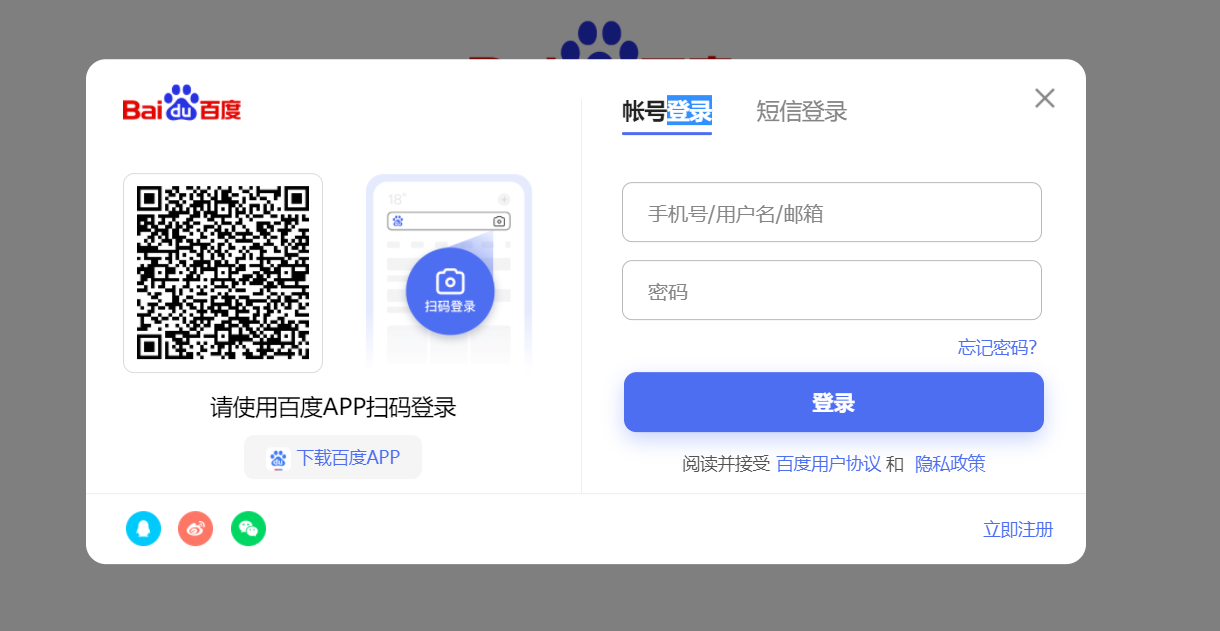
该页面一般都是ifarme标签,内部有完整的html文档结构
查找该标签内部的标签时需要指定一个参数
eg:
driver.switch_to.frame('iframeResult')
seleuinm相关知识、思路和防爬措施
滑动验证码
针对滑动验证码可以通过seleuinm自动完成,也就是之前讲的动作链
#滑动验证码不推荐使用程序破解,太过繁琐,重在了解思路
注意:
''' 滑动验证码在拖动的时候速度不能太快 内部有监测机制 速度过快一步到位会被认为是爬虫程序 '''
无界面操作
调用模块
from selenium import webdriver from selenium.webdriver.chrome.options import Options
执行内容
# 申明对象 chrome_options =Options() # 设置无界面 chrome_options.add_argument('--headless') chrome_options.add_argument('--disable-gpu') bro = webdriver.Chrome('D:\python3.6.8\Scripts\chromedriver.exe',chrome_options=chrome_options) bro.get('https://www.baidu.com') # 获取页面HTML代码 print(bro.page_source)

from selenium.webdriver import ChromeOptions option = ChromeOptions() option.add_experimental_option('excludeSwitchers',['enable-automation']) bro = webdriver.Chrome(options=option)
cookie登录案例
思路
1,用selenium模块打开网址
2设置时间让用户手动登录
3再用selecuinm获取cookie
4用requests使用cookie去模拟爬取数据
执行
# 调用模块 import requests from selenium import webdriver import time import json # 定义网络地址 url = 'https://account.cnblogs.com/signin?returnUrl=https%3A%2F%2Fwww.cnblogs.com%2F' # 常见对象 driver = webdriver.Chrome('D:\python3.6.8\Scripts\chromedriver.exe') # 访问网页 driver.get(url=url) # 预留时间让用户输入用户名和密码 time.sleep(30) # 刷新页面为获取cookie driver.refresh() # 获取登录成功之后服务端发返回的cookie数据 c = driver.get_cookies() print(c)

保存数据
# 写入文件保存以备用 with open('xxx.txt', 'w') as f: # 以json格式写入 json.dump(c, f)
去除数据发送请求模拟登录
# 设施cookies存储变量 cookies={} # 打开文件 with open('xxx.txt', 'r') as f: # 输出数据到di di = json.load(f) # 获取数据,把数据转化为requesrts使用的模式,只有name和value是所需要的 for cookie in di: # 数据转化 cookies[cookie['name']] = cookie['value']
print(cookies)

# 使用该cookie完成请求 response = requests.get(url='https://i-beta.cnblogs.com/api/user', cookies=cookies) # 选择编码 response.encoding = response.apparent_encoding # 获取回复数据 print(response.text)

图片验证吗思路
思路1:
图像识别技术 软件:Tesseract-ocr 模块:pytesseract
思路2:
打码平台
花钱买第三方服务
先使用代码识别如果不想其实还有一帮员工肉眼识别
思路3:
自己人工识别
B站视屏案例思路
具体代码网址:
https://www.cnblogs.com/xiaoyuanqujing/articles/12016934.html
https://www.cnblogs.com/xiaoyuanqujing/articles/12014416.html
""" b站有很视频是一分为二的 分为视频(只有画面没有声音)和音频(视频配套的声音) """
思路
1,获取任意视频地址
2.分析页面,代开network一个为视屏每一个为音频
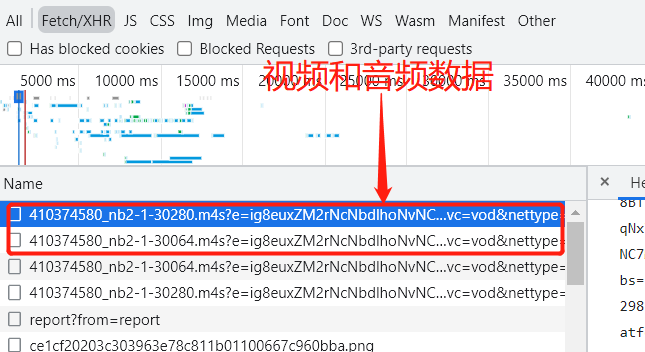
3.查看数据加载方式,url 4.向url发送请求,用requests获取 5.将数据存储如文件,循环发送请求加载,把数据写入文件即可
红素网小说案例
案例网址:https://www.cnblogs.com/xiaoyuanqujing/protected/articles/11868250.html
思路
1.小说详情页面鼠标左右键禁用,但是支持按F12调出控制台
2.小说文字不全是直接加载,查找相关二次请求
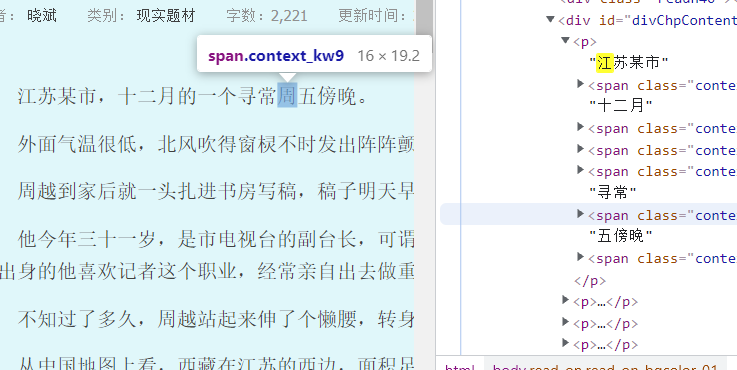
3.通过观察请求发现网址和请求体信息的对应关系


4,涉及到数据解密肯定需要写js代码 并且一般都会出现关键字decrypt,在source中点击top右键search in all file,搜索decrypt,可以发现多个数据
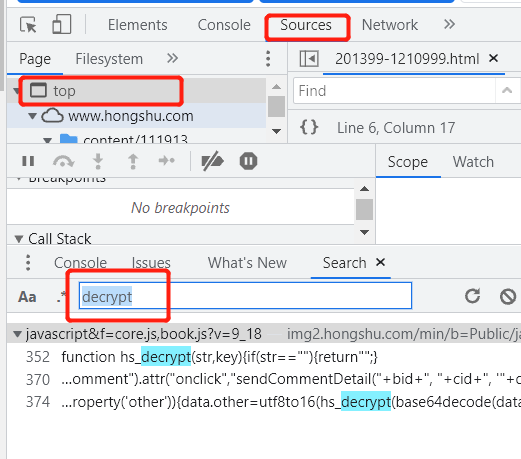
5.通过寻找content和data发现关键数据
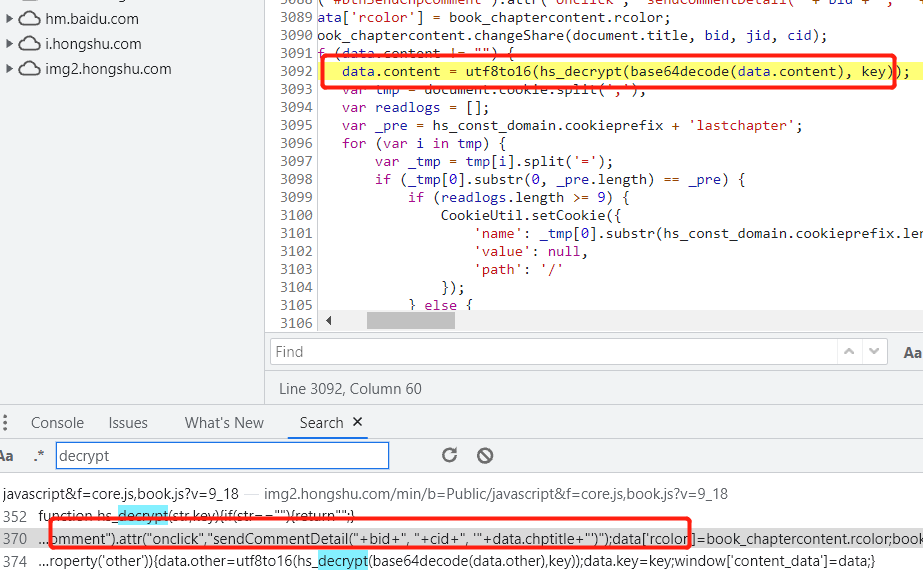
6.点击内容查看数据,确定所要的内容为之前加密数字


7.获取content的数据和other的数据,得到js代码,这就需要进行专门的数据进行解密 8.只解密content的代码会有确实,也需要other代码 9.创建html文本储存content的js代码和other的js代码
